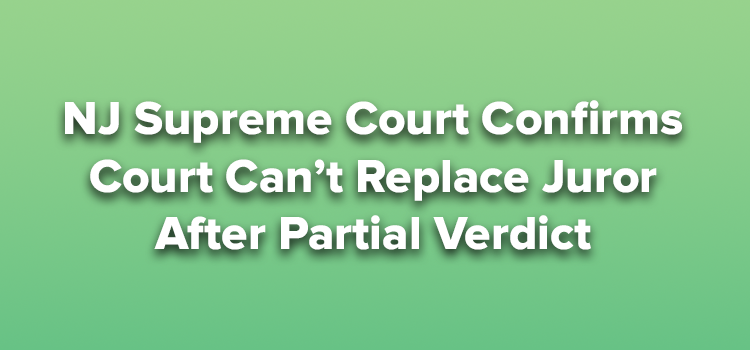In State v. Antwan J. Horton (A-26-19/082698) (Decided June 12, 2020), the Supreme Court of New Jersey confirmed that a trial court can’t replace a juror after the jury announced that they had reached a partial verdict. While the state’s highest court found that it was settled law, the trial court and Appellate Division had reached the opposite conclusion.

Facts of State v. Horton
After the jury announced that they had reached a partial verdict, the trial court excused and replaced a juror who had a preplanned vacation and who had been part of deliberations. The judge did not have the jury return a partial verdict. Instead, the court excused the juror and reconstituted the jury with a replacement juror.
Defendant Antwan Horton argued that the deliberations had proceeded too far to reconstitute the jury and moved for a mistrial. Nevertheless, the trial judge denied that motion. Defendant requested that the judge voir dire the jury to determine its ability to begin anew with the replacement juror. Instead, the judge instructed the reconstituted jury to discard the partial verdict and begin deliberations anew. The jury reached a unanimous verdict three days later.
Defendant appealed, arguing that the juror substitution after the jury had reached a partial verdict denied him a fair trial. The Appellate Division affirmed defendant’s conviction, speculating that the substituted juror was a “full participant[] in the mutual exchange of ideas.” The appeals court noted that during deliberations, the reconstituted jury requested transcripts, asked for testimony to be played back, and asked additional questions before returning a verdict three days later. Relying on the totality of the circumstances, the court found that the trial court did not abuse its discretion by substituting a juror.
NJ Supreme Court’s Decision in State v. Horton
The New Jersey Supreme Court reversed in a per curium opinion. It held that under settled New Jersey law, juror substitution is impermissible if the jury has reached a partial verdict. According to the court, the proper course is for the trial court to take the partial verdict and declare a mistrial on the open counts.
“We have rich and fulsome jurisprudence on the issue of juror substitution in the face of a jury having reached a partial verdict. Quite simply, substitution is impermissible,” the court explained. “The proper course is for the trial court to take the partial verdict and declare a mistrial on the open counts.”
As noted by the court, it previously held in State v. Ross, 218 N.J. 130, 151 (2014) that “[w]hen the circumstances suggest a strong inference that the jury has affirmatively reached a determination on one or more factual or legal issues the trial court should not substitute an alternate for an excused juror.” According to the New Jersey Supreme Court, although the settled body of law directly applied, it was not followed at the trial or appellate level.
“In a case like this, where defendant was facing charges of murder, attempted murder, and weapons possession offenses, we cannot know whether the jury will ‘start anew’ with the entry of a substitute juror and discard their views simply because there is a new juror amongst them,” the court wrote. “Nor can we know if the new juror will exercise independence or simply go along with the opinions of the existing jurors. We cannot know or speculate whether the replacement juror was a ‘full participant[] in the mutual exchange of ideas.’” Based on the foregoing, the court held that the safest and fairest course is to take a partial verdict, declare a mistrial, and constitute a new jury to hear the remaining counts.
